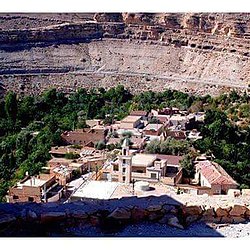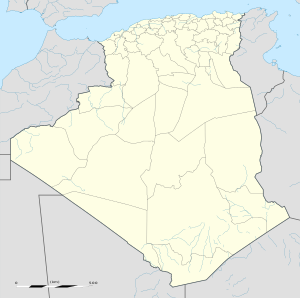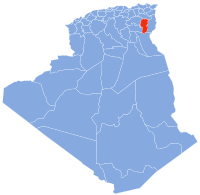
Algeria, officially the People's Democratic Republic of Algeria, is a country in North Africa. Algeria is bordered to the northeast by Tunisia; to the east by Libya; to the southeast by Niger; to the southwest by Mali, Mauritania, and Western Sahara; to the west by Morocco; and to the north by the Mediterranean Sea. It is considered to be a part of the Maghreb region of North Africa. It has a semi-arid geography, with most of the population living in the fertile north and the Sahara dominating the geography of the south. Algeria covers an area of 2,381,741 square kilometres (919,595 sq mi), making it the world's tenth largest nation by area, and the largest nation in Africa, being more than 200 times as large as the smallest country in the continent, The Gambia. With a population of 44 million, Algeria is the ninth-most populous country in Africa, and the 32nd-most populous country in the world. The capital and largest city is Algiers, located in the far north on the Mediterranean coast.

Albert Camus was a French philosopher, author, dramatist, and journalist. He was awarded the 1957 Nobel Prize in Literature at the age of 44, the second-youngest recipient in history. His works include The Stranger, The Plague, The Myth of Sisyphus, The Fall, and The Rebel.
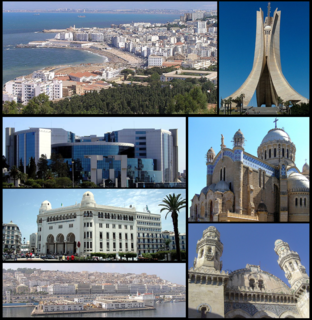
Algiers is the capital and largest city of Algeria. The city's population at the 2008 Census was 2,988,145 and in 2020 was estimated to be around 4,500,000. Algiers is located on the Mediterranean Sea and in the north-central portion of Algeria.

This article is about the demographic features of the population of Algeria, including population density, ethnicity, education level, health of the populace, economic status, religious affiliations and other aspects of the population.
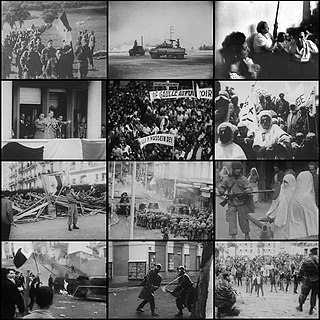
The Algerian War, also known as the Algerian Revolution or the Algerian War of Independence, and sometimes in Algeria as the War of 1 November, was fought between France and the Algerian National Liberation Front from 1954 to 1962, which led to Algeria winning its independence from France. An important decolonization war, it was a complex conflict characterized by guerrilla warfare and war crimes. The conflict also became a civil war between the different communities and within the communities. The war took place mainly on the territory of Algeria, with repercussions in metropolitan France.

Oran is a major coastal city located in the north-west of Algeria. It is considered the second most important city of Algeria after the capital Algiers, due to its population and commercial, industrial, and cultural importance. It is 432 km (268 mi) west-south-west from Algiers. The total population of the city was 803,329 in 2008, while the metropolitan area has a population of approximately 1,500,000 making it the second-largest city in Algeria.

French Algeria, also known as Colonial Algeria, was the period of French colonisation of Algeria. French rule in the region began in 1830 with the invasion of Algiers and lasted until the end of the Algerian War of Independence in 1962. While the administration of Algeria changed significantly over the 132 years of French rule, the Mediterranean coastal region of Algeria, housing the vast majority of its population, was an integral part of France from 1848 until its independence.

The Maghreb, also known as Northwest Africa, is the western part of North Africa and the Arab world. The region includes Algeria, Libya, Mauritania, Morocco, and Tunisia. The Maghreb also includes the disputed territory of Western Sahara and the Spanish cities Ceuta and Melilla. As of 2018, the region had a population of over 100 million people.

Abdelaziz Bouteflika was an Algerian politician and diplomat who served as President of Algeria from 1999 to his resignation in 2019.

Boumerdès is a province (wilaya) of northern Algeria, located in the Kabylia region, between Algiers and Tizi-Ouzou, with its capital at the coastal city of Boumerdès just east of Algiers.
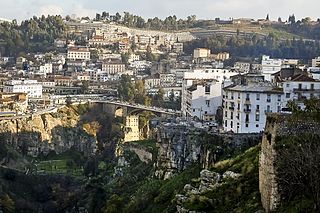
Constantine, also spelled Qacentina or Kasantina, is the capital of Constantine Province in northeastern Algeria. During Roman times it was called Cirta and was renamed "Constantina" in honor of emperor Constantine the Great. It was the capital of the French department of Constantine until 1962. Located somewhat inland, Constantine is about 80 kilometres from the Mediterranean coast, on the banks of the Rhumel River.

The Algeria national football team represents Algeria in men's international football and is governed by the Algerian Football Federation. The team plays their home matches at the 5 July Stadium in Algiers and Miloud Hadefi Stadium in Oran. Algeria joined FIFA on 1 January 1964, a year and a half after gaining independence. They are the current champions of the FIFA Arab Cup.
The dinar is the monetary currency of Algeria and it is subdivided into 100 centimes. Centimes are now obsolete due to their extremely low value.

Mouloudia Club d'Alger, referred to as MC Alger or MCA for short, is an Algerian football club based in Algiers. The club was founded in 1921 and its colours are red, green and white. Their home stadium, the Stade 5 Juillet 1962, has a capacity of 65,000 spectators. They also receive their opponents in Omar Hamadi Stadium. The club is currently playing in the Algerian Ligue Professionnelle 1.
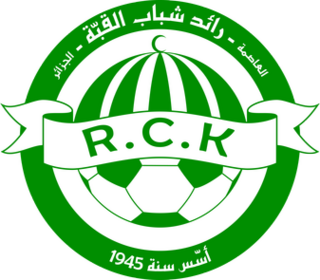
Raed Chabab Kouba, known as RC Kouba or simply RCK for short, is an Algerian football club based in Kouba, a district of Algiers. The club was founded in 1945 and its colours are green and white. Their home stadium, Mohamed Benhaddad Stadium, has a capacity of some 10,000 spectators. The club is currently playing in the Algerian Ligue 2.
The Algeria women's national football team represents Algeria in international women's football. The team is currently ranked 76th in the world in the FIFA women's rankings. The team's highest ranking was 64th, in June 2009. The team plays its home games at the Stade du 5 Juillet in Algiers and is coached by Radia Fertoul since August 2018. Algeria played its first match on May 14, 1998, against France, and lost 14–0.

The Algerian Ligue Professionnelle 1 ; known as Championnat National de Première Division or Ligue 1 for short, and formerly known as the Championnat National 1, is the Algerian professional league for association football clubs. It is the country's primary football competition and serves as the top division of the Algerian football league system. Ligue 1 is one of two divisions making up the Ligue de Football Professionnel, the other being Ligue Professionnelle 2. The league is contested by 16 clubs, and it operates on a system of promotion and relegation with Ligue 2. In 2009 it was known as Championnat d'Algérie D1 Nedjma and from 2010 to 2014, it was known as Ligue Professionnelle 1 Nedjma as it is sponsored by Kuwaiti telecommunications company Nedjma. From 2014, the league is officially known as Ligue Professionnelle 1 Mobilis as it is sponsored by Algerian telecommunications company Mobilis.

Algeria first competed at the Olympic Games in 1964, and has participated in every Summer Olympic Games since then, except for the boycotted 1976 Summer Olympics. Algeria has also sent athletes to the Winter Olympic Games on three occasions. The National Olympic Committee for Algeria is the Comité Olympique Algérien, founded in 1963.

The Entreprise nationale de radiodiffusion sonore is Algeria's state-owned public radio broadcasting organisation. The group provides services in Arabic, French and Berber and currently operates six national stations and one international plus a network of regional stations.
